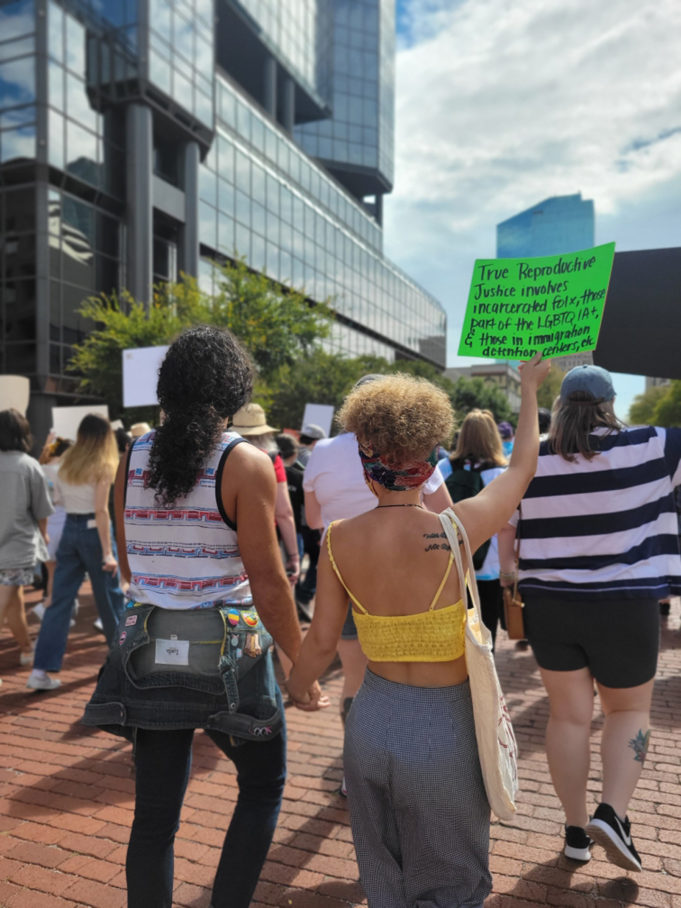I am a queer, biracial woman who started with Texas Jail Project as their North Texas Community Organizer in early August. One month later, the six-week abortion ban went into effect.
When I attended the Fort Worth Women’s March and Rally for Abortion Justice, I was deeply disheartened by the lack of inclusivity and visibility of non-binary folks, the LGBTQIA+ community, people with disabilities, and women of color as I stood among many white women.
Earlier this year, I read the book Hood Feminism: Notes from the Women that a Movement Forgot by Mikki Kendall. The entire book is essential reading, but I especially recommend reading the chapter called “Reproductive Justice, Eugenics, and Maternal Mortality.”
I attended the march and rally to make a point as I marched through Downtown Fort Worth with a sign that read, “True reproductive justice addresses environmental racism, lack of prenatal care, food apartheid, housing, discriminatory practices, etc.” I also wanted to shed light on the people often forgotten as part of this movement: the incarcerated. Hood Feminism taught me reproductive justice is not only an abortion issue but myriad problems that deprive vulnerable communities of access and choice.
During my four months as an organizer, a lot of the incarcerated I’ve interacted with have been women. One woman told me she was experiencing symptoms of pregnancy but jailers at Tarrant County Jail refused to allow her to see a nurse practitioner or to request a pregnancy test. She experienced excessive use of force by jailers and complained of food being uncooked. The meager portions forced her to eat scraps off someone else’s plate.
Another woman who found out about her pregnancy prior to arrest had her prenatal vitamins discontinued and contracted COVID-19 while being incarcerated at the Tarrant County Jail. She lost weight and described the small food portions and lack of nutrition she was given on a daily basis, referring to the meat as “mystery meat” and sharing that she would only be given two spoonfuls of vegetables with her meal. She had difficulty keeping food down and tried to force-feed herself for the sake of her baby.
In May 2020, an unattended woman gave birth inside her cell at the Tarrant County Jail, and the baby died 10 days later. The Tarrant County Sheriff’s Office stated, “No violation was discovered.” Other allegations have been made by pregnant people in other county jails alleging abuse.
I share these stories to shed light on the lack of access to reproductive justice in county jails. By Texas law, counties have had to record the number of pregnant women booked in their jails since 2015. In 2019, legislation passed that requires an OB-GYN to specify minimum standards for people who are pregnant. The law banned the use of restraints on pregnant people during pregnancy and 12 weeks after delivery.
Despite the passage of these laws over the past several years, we have continued to see negligence of pregnant women in county jails who are disregarded in the conversation around reproductive rights. Only people who are identified as “females” are reported by jails, and when it comes to jail advocacy and reproductive justice, all other populations are not included (i.e., the LGBTQIA+ members, people with physical and intellectual disabilities, people with mental illnesses, non-binary folks, and more).
As the fight continues for abortion access in Texas, let us not forget the people suffering in confinement. Their stories deserve to be told. They should be entitled to the same reproductive rights as the person who is free. People should be marching and rallying for them like they do at women’s marches.
Tamera Hutcherson,
Fort Worth
This letter reflects the opinions of the author and not the Fort Worth Weekly. To submit a letter, please email Editor Anthony Mariani at Anthony@FWWeekly.com. Letters will be gently edited for factuality and clarity.











